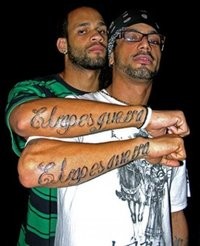
Cuban hip-hop was given an international profile 10 years ago by Orishas, the talented group who made a name for themselves and the genre after releasing the album A Lo Cubano from their new home in France.
Since then, the duo Los Aldeanos has been the rising recognizable face of the youth driven musical movement. Rappers El Aldeano and El B have made a reputation for themselves as hip-hop critics of the Cuban reality, with songs like “Miseria Humana” cementing their place in the island's artistic underground.
This weekend, as part of a controversial cultural exchange, the group, alongside Silvito el Libre (son of legendary Cuban musician Silvio Rodriguez), performed in Miami for the first time. To preview the show, our sister publication, The Miami New Times wrote that “the collective is virulently anti-government and explicitly anti-Fidel.”
]
Not everyone agreed with that notion; right-wing Cuban exiles in the
city protested the concert at the Miami-Dade County Auditorium as they
felt the artists were propaganda agents of the Castro regime. In the
lead up to the show, an uploaded YouTube diatribe lambasted the rappers
for glorifying Argentine-born Cuban revolutionary Ernesto “Che” Guevara
and slain Chilean Communist folk singer Victor Jara.
Agendas from all sides were set on all systems go as soon as the
rappers arrived a few days before the concert. Microphones and cameras
from Univision and other Spanish language media crowded the MCs with
provocative questions about censorship and the Cuban government. Los
Aldeanos and Silvito el Libre stuck to a basic message that they were in
Miami for unity and love among the often divided Cuban people.
Documentarian Vanessa Diaz, who directed and produced the film Cuban Hip Hop: Desde el Principio,
comments that the process underscores the folly of a notion that an
apolitical cultural exchange between Havana and Miami can occur. “I
think the part that's really unfortunate about this whole thing is that
the artists are being used as tools,” she says. “Obviously all of these
artists are really talented but people are putting words in their
mouth.”
Los Aldeanos' former manager said months ago in an article that Miami
and Washington wanted to manipulate what the group represents. Media
attention has clamored for sound bites critical of the Cuban government.
“If they say the things they say in Cuba and live in Cuba, it seems
arbitrary to critique what they say outside of Cuba,” Diaz remarks
contextualizing the agendas in play.
Despite the rappers message of unity and love, right-wing detractors
fueled their rage anyway when El Aldeano said in an interview on MegaTV
that “our problem is not with Castro” reiterating that Cuba is bigger
than Castro. At last night's concert, however, the group said to the
audience “We are not Castro” to rousing applause.
In the world of Cuban hip-hop, this fine line of seemingly mixed
messages is nothing new. It also lends itself to criticism from groups
that lay claim the music's independent underground mantle as well.
Odaymara Cuesta of Krudas Cubensi, feminist female rappers who have
relocated to the U.S. and have performed in Santa Ana on previous
occasions, saw the cultural exchange in a context familiar to debates
about the relationship between the Cuban state and the art form.
“Evidently they are under the pressure of the Cuban government,” Cuesta
says of Los Aldeanos, “and to continue traveling they have to change the
focus of their interviews and soften their words before the
international press.”
“If they want to live in Cuba and leave the island, they have to sell
themselves to those who would permit them to do so,” she adds.
On the other hand, groups like Krudas Cubensi who have immigrated,
traveled all over and continue to perform their music haven't been fully
embraced by hip-hop radio stations or record labels here in the United
States-a question Spanish language media failed to ask. “An all-women,
multiracial, fiercely feminist, vegan, pro-black and out-lesbian hip-hop
group” as I described them, isn't rotated heavily on radio playlists
here and weren't deemed worthy of promotion by the Cuban regime they
left behind years ago. Independent support systems in Cuba and the U.S.
helped their music reach new audiences in that void.
Cuba and the U.S. may have something in common after all.

Gabriel San Román is from Anacrime. He’s a journalist, subversive historian and the tallest Mexican in OC. He also once stood falsely accused of writing articles on Turkish politics in exchange for free food from DönerG’s!

